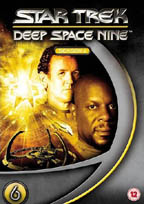Waltz
(Star Trek - Deep Space Nine episode production code 535)
written by Ronald D. Moore
directed by René Auberjonois
In many ways, this is a very entertaining and important episode.
I'm a fan of actor Marc Alaimo, who gives a tour de force performance
as his character of Gul Dukat is explored in greater detail than
ever before, with great assists from Nana Visitor,
Jeffery Combs, Avery Brooks, and undoubtedly
director René Auberjonois.
Though at times remarkably humorous, we eventually find that Dukat is
in actuality at one of his darkest and most disturbing hours here.
Understandably so, as we go through the details of what's going on
inside him.
The saddest part is that this is really the last time that Dukat is
interesting as a character on Deep Space Nine. Sisko's final
response to what he learns in this episode once more betrays
the abandonment of Roddenberry-style ideals, and I assume he
is expressing the attitudes of the writing staff and producers
of the show. Dukat's entire character is dumbed down to a label
of "evil", which in my experience is used by people who have given
up on trying to understand their opponents in a given conflict.
If we really give up on him, he doesn't then deserve the amount
of screen time that he continued to get in future episodes.
Of course, Alaimo's performances are always compelling, therefore
we should have more of Dukat on the show until the very end,
but if the character is going to remain interesting, he needs
to maintain all his multiple facets, his shades of grey,
his kaleidoscope of colours, his good traits that surprise us
time and again. No one truly is evil, and if the writing staff
can't understand that about Dukat, they won't be able to keep us
interested in seeing him.
I think a large part of the problem in this episode in particular
is that it can easily seem as though
the thing that decides Sisko's opinion (and the audience's
I might add should they agree with him) is all backstory that we
never actually saw on Deep Space Nine. What we have seen through
Alaimo's portrayal over five and a half years is a much more
charming, thoughtful, redeemable character with emotional scars
and rough edges who has made some bad choices.
However, the episode goes a step darker as Dukat's frustrations
boil over and he starts physically beating Sisko just before
a cut-to-commercial leaves most of this ugliness off-screen...
before it can truly register.
I'm far less likely to give Dukat the benefit of any doubt
after that. However, Dukat also had the most heart-wrenching response
to the biggest, most unnecesary moment of injustice inflicted by the writers
at the end of the season's opening six-episode arc,
which can easily haunt.
I find I still can't blame Dukat for the "evils" on screen.
Rather, it's the writers who appear in my sights
for all that unravels badly before us.
More to the point, what does it say about Sisko and Dax that they
should give up on any attempt to see and draw out the better
side that Dukat still has within him? They don't give up on
Damar, or the Changelings, and Odo will be seen to give Weyoun
a chance later on..... It remains true that the best dramas
are not enemy-centered, as the Dukat plots now become.
Ron Moore definitely does work some significant magic here
to put a lot of good stuff into an episode that in some respects
creates anticipation of a cheap bottle show stuck in a cave
for 38 minutes, and by the work of the actors and a good director,
it really rises above that.
It is just such a shame that
the coda's dialogue is a tainted brush,
painting over this fine
display of complex characterization and
dumbing it down to a level that did not bode well for the future
of this character with so much potential.
In fact, I think Dukat's best showing during season six
is in the episode "Sons and Daughters" during the opening multi-episode arc.
Though "Sons and Daughters" is not a great episode as a whole,
there are so many remarkable moments that I remember long term
which are actually found in it. We may distrust many, if not most,
of the things that Dukat says over the years, but when he expresses
how much it means to him that Kira and his daughter Ziyal have
a strong and supportive bond,
I never doubt that he is being genuine in that moment.
That could have been a nice rock upon which to build the house
of Dukat's better side. Instead we got "Waltz", and it all went
over a cliff after that.... retroactively and all.
|
|





 Region 1, NTSC, U.S.
Region 1, NTSC, U.S. Region 1, NTSC, Canada
Region 1, NTSC, Canada Region 2, PAL, U.K. (regular)
Region 2, PAL, U.K. (regular)
